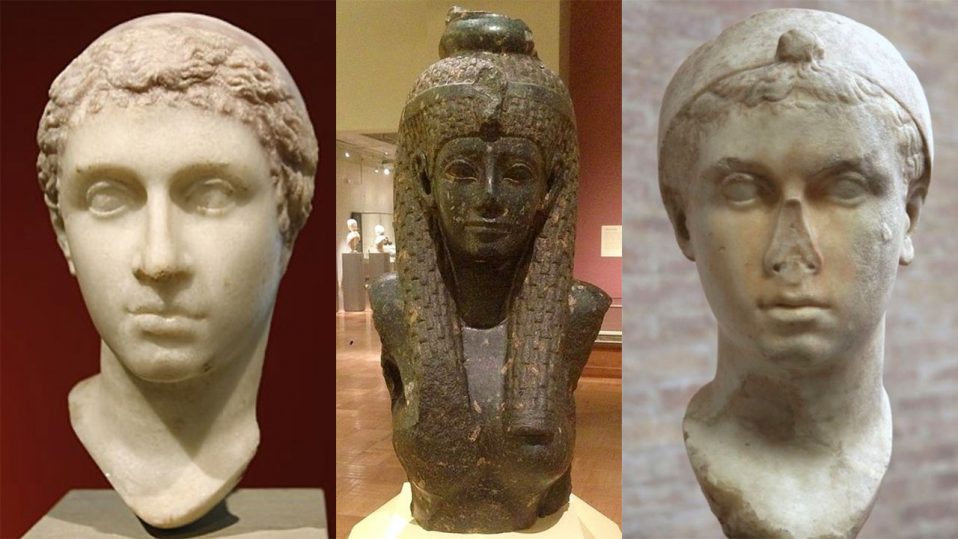Join us for EMBCA’s “The Legacy of Cleopatra VII Philopator / Κλεοπάτρα Φιλοπάτωρ Queen of the Ptolemaic Kingdom” Webinar Panel Discussion on Sunday, August 6, 2023 at 2 P.M. EST/ 9 P.M. Athens/ Cairo EEST on the anniversary of her passing on August 10, 30 BC. The panel discussion will be introduced and moderated by Lou Katsos and Marina A. Belessis Casoria, EMBCA’s President and EVP respectively. Our distinguished panel, in formation, includes Associate Professor Rebecca Kennedy Chair of Classical Studies at Denison University; Associate Professor Jackie Murray in the Classics Department of the State University of New York at Buffalo; and Assistant Professor Yiannis Kalliontzis in the History Department of Ionian University.
Cleopatra VII, the last active ruler of the ancient Egyptian civilization, led a remarkable life filled with accomplishments that have left an indelible mark on history. Born in 69 BCE, Cleopatra ascended to the throne at the age of 18, and her reign would be remembered as one of the most fascinating periods in Egypt's history. Cleopatra was a gifted linguist, fluent in multiple languages (including Egyptian, Ethiopian, Hebrew, Arabic, Median, Parthian, Latin, and her native Koine Greek), which enabled her to communicate with various diplomats and conquerors. Cleopatra was exceptionally well-educated and skilled in chemistry, economics, mercantile strategy, military theory, and law. She was also well versed in mathematics, philosophy and debate, and was known for her formidable strategic thinking and geopolitical acumen. Cleopatra understood the value of forging alliances, and she engaged in diplomatic relationships with Rome, particularly with two of its most powerful leaders, Julius Caesar and Mark Antony.
Her relationship with Julius Caesar began in 48 BCE when she sought his support against her brother in a civil war for control of Egypt. Cleopatra's intelligence and charm captivated Caesar, and their liaison bore fruit when she gave birth to their son, Caesarion. Though their relationship was cut short by Caesar's assassination, Cleopatra's influence remained significant in Rome.Following Caesar's death, Cleopatra aligned herself with and had a romantic relationship with Mark Antony, one of Caesar's allies. Together they formed a formidable force against their political rivals. Cleopatra's charisma and intellect were instrumental in solidifying their partnership, and she became an influential figure within the Roman Empire. However, their alliance faced a tragic end during the Battle of Actium in 31 BCE, where Antony and Cleopatra suffered a devastating defeat against Octavian, later known as Emperor Augustus. Realizing the inevitable, Cleopatra took her own life, a poignant end to a captivating and eventful life.
Cleopatra's accomplishments extended beyond her personal relationships. She sought to enhance the prosperity and grandeur of Egypt. She invested in infrastructure projects, encouraged the development of the arts and sciences, and championed the cultural heritage of her kingdom.
Throughout history, Cleopatra's legend has been embellished with tales of her seductive beauty and allure. Yet, her true power lay in her intelligence, diplomacy, and strategic thinking. Cleopatra's reign as a queen and her relationships with influential leaders continue to intrigue and inspire scholars and storytellers to this day. Join us for a discussion on the legacy of one of the most fascinating women in history on the anniversary of her passing.

EMBCA is an organization exempt from Federal Income Tax under Internal Revenue (IRC) Section 501(c)(3), classified as a public charity, and qualifies to receive tax deductible bequests, devises, transfers or gifts under Section 2055, 2106, or 2522 . Donors can deduct contributions they make under IRC Section 170. Thank you all again for your continuing enthusiasm and support of our events !!

